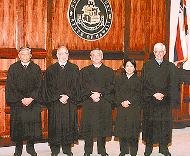3/5/2010
Hawaii Supreme Court Strikes Down Another Speeding TicketPolice speedometer calibration testimony inadmissible without proper foundation, Hawaii Supreme Court rules.

The Supreme Court of Hawaii is serious about not allowing police to merely assert that their methods to detect speeding are accurate. The court insisted that this accuracy must be proved beyond a reasonable doubt and, to show the court meant what it said, the "excessive speeding" case against motorcyclist Zachariah I. Fitzwater was thrown out on Wednesday.
In this case, Honolulu Police Officer Neal Ah Yat claimed that he paced Fitzwater driving at 70 MPH in a 35 MPH zone on January 24, 2007. On that day, Yat had been unable to get a laser speed reading on Fitzgerald's sport bike because it was too small. Yat fired up his cruiser and caught up to the motorcycle to begin pacing its speed from six car lengths behind.
At trial, the officer produced a five-month-old card that purported to certify the accuracy of his patrol car's speedometer. These "speed checks" are conducted once a year as part of a cruiser's routine maintenance cycle at Jack's Speedo Shop. Yat could not testify that he took the vehicle to be checked nor did he have any knowledge of how the accuracy was verified. The high court found this insufficient.
"In order for the results of speed checks to be admissible, the state must establish: (1) how and when the speed check was performed, including whether it was performed in the manner specified by the manufacturer of the equipment used to perform the check, and (2) the identity and qualifications of the person performing the check, including whether that person had whatever training the manufacturer recommends in order to competently perform it," Justice Mark E. Rectenwald wrote for the majority. "The required information was missing from the record here. It was not established by Ah Yat in his testimony. Nor was it established by the speed check card."
Without this essential element, the supreme court vacated the lower court judgment against Fitzwater which had imposed a $630 fine, 36 hours of community service and a thirty-day license suspension.
In September, the high court had struck down a speeding ticket because the state failed to produce evidence beyond the assertion of a manufacturer that a laser speed gun produced accurate readings (view decision). Since then, two appellate court rulings have overturned citations because the state has yet to mount a case sufficiently convincing to the judges.
A copy of the supreme court case is available in a 255k PDF file at the source link below.


